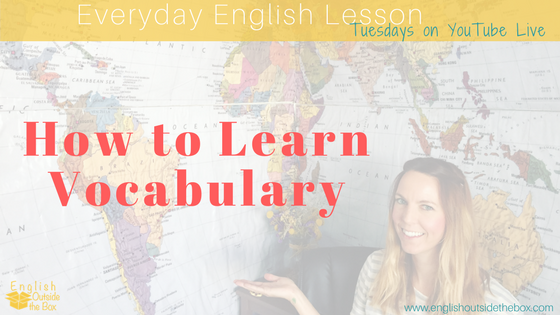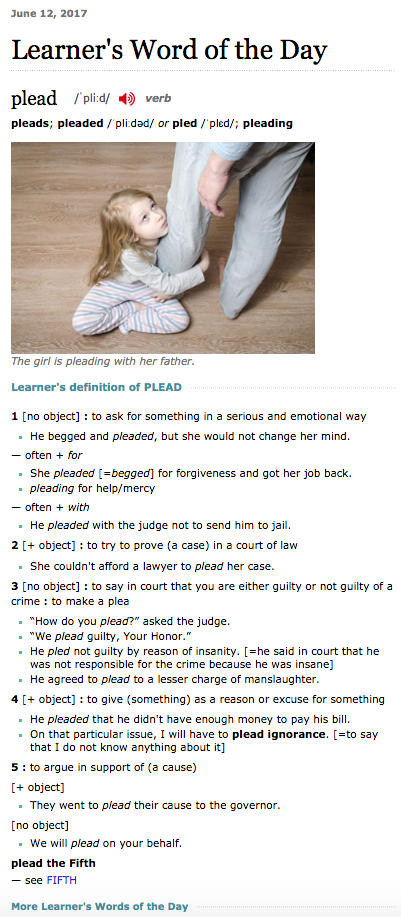
How to Learn Vocabulary
Vocabulary: the words that a person knows and uses. This is how Merriam-Webster Learner’s Dictionary defines the word vocabulary. So if you need to use English, then it’s obvious you need to increase your vocabulary. This is not new information or something you didn’t already know, but I am sure you struggle with learning and using new vocabulary. That is probably why you are here!
How much vocabulary do you know?
How much new vocabulary do you use?
Unfortunately, it’s common for English learners to get stuck using the same vocabulary they already know. Many learners find it difficult to not only learn new vocabulary but to use it in their own conversations later on. Luckily, today’s lesson will help you overcome this obstacle.
In today’s lesson, you are going to learn:
- how to learn new vocabulary
- how to remember new vocabulary
- how to start using new vocabulary every day!
How to Learn Vocabulary
Let’s begin with how to learn new vocabulary. In the video, I briefly mentioned a couple of ways that you can learn vocabulary right here on this blog, or on my YouTube channel.
On this blog, you can explore:
On my YouTube channel, you can review all of the videos but specifically check out this playlist:
However, the main topic of today’s live English lesson was using the “word of the day” feature on many (many) vocabulary apps and websites. There are many that I can name, but I wanted to focus on my favorite dictionary, Merriam-Webster Learner’s Dictionary. I’ve talked about this dictionary a lot because I think it’s so useful for English learners. It uses language that is easy to understand and it always gives tons of examples.
You can download this app on your phone or bookmark the site on your computer, and check out the new “word of the day” every day before you begin your morning routine. The dictionary will give the word (or expression), a picture, the definition, and an example. Here is what you can expect:
You can click the microphone button and hear the word.
You’re able to read the (multiple) definitions.
You can also review multiple sentences to get an idea of some additional context, as well.
These are only the first steps in learning the new vocabulary word though. Last week, I talked about 7 steps to naturally learn and use vocabulary so you can read that lesson and watch the video here, and I’ll only slightly reiterate the information today.
How to Remember Vocabulary
Once you hear the vocabulary word, read the definitions and sentences, how can you expect to remember the vocabulary for later?
The answer to that is you must start using the new language and specifically applying it to your life in a relevant and meaningful way.
Let’s look at the example of the word above, plead. I want you to think: How can you use this word? In what situations would you naturally talk about “asking for something in a serious and emotional way” You can look at the sample sentences. Have you ever had to plead for a job back? Have you ever pleaded/pled for forgiveness? Have you ever needed someone to change their mind about something important, so you pleaded?
Looking at some of the other definitions and examples, plead is often used in a courtroom or law setting. Maybe you’re a lawyer or studying to be one. This word would definitely be applicable to you!
So the best way to remember vocabulary is to make a connection with you and the word. Find the relevance in your life, and think about the ways that it can be useful. If you try and imagine using this word naturally, in settings or situations that can (and will) happen, then you’ll likely remember the new language when this situation happens.
Remember, in order to remember vocabulary, you must start using it every day or as much as you can!
How to Start Using Vocabulary Every Day
This may be easier than you think, which is great news. When you learn new vocabulary, you should immediately start thinking about how you can use it naturally in your own conversations. Studying new vocabulary and thinking about this context is a 1-day task and as you review new vocabulary say the words out loud. Read the sentence examples you have available out loud. Even though you’re not having a conversation, talking aloud will help speaking skills. Over the next few days you can create new sentences and examples, discussion questions, write stories, and sample dialogues that feel natural to you.
I’d like to elaborate on some of those ideas:
- Create new sentences and examples: this is finding the relevance to you and your life. You can use the same structure as the “word of the day” sentences, and just change the nouns and verbs. Or, you can challenge yourself and write completely new ideas. 🙂
- Create discussion questions: these are questions that will force a discussion or a conversation. These are usually “information” questions and not just yes-no questions. You can create these and then use them with friends and family, an English conversation partner, or in your own classrooms and tutoring sessions. Feel free to share them here!
- Write stories: these can be creative stories (fiction) or stories based on you, your life, and real events. By writing creative stories, you’re also challenging yourself to think in English and come up with new ideas outside of what you normally talk about.
- Write sample dialogues: this can be 100% fiction and creative like the stories above, or they can be example situations that you think could really happen with you! You can practice reading these conversations aloud or with your friend/conversation partner.
As you can see, you want to try and give yourself some variety when practicing and using new vocabulary (or any new language). You can do these different activities throughout the week ans give yourself something new each day. Challenge yourself and have some fun!
Practice Makes Perfect
Start practicing what you’ve learned today by completing some of the tasks above. You can share your sample sentences here, or pop into our Facebook group and write some discussion questions there to promote conversation.
Until next time,
Happy Studying! ♥
Do you know a friend studying English, please share this English lesson with them today!
Don’t forget! You can learn more vocabulary, phrasal verbs, and English expressions in the Phrasal Verb Conversation Club! Sign up here or get more information via email below!
The Conversation Club will provide you with 6 group conversation calls to practice with a real teacher and a group message community to connect with other members.
You will also get weekly English lessons to help your vocabulary, listening, reading, pronunciation, and more!
Try the Club for 1 week, free! Join the 1-week free trial here.


